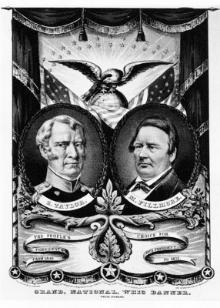



辉格史
术语
英国历史学家赫伯特·巴特菲尔德(Herbert Butterfield:1900年10月7日–1979年7月20日)于他那有影响力的小本著作 The Whig Interpretation of History (1931) 提出 "Whig history" 词汇。这是由反对英国托利党的辉格主义(Whiggism)所演变出来的词。托利党提倡国王权力,辉格主义则是提倡英国国会的权力。
这词汇也被广泛用在除了英国史以外的历史主题(例如,科学史),用来批评任何目的论(或目标导向)、英雄主义以及超历史性(英语:Transhistoricity)的论述方式。“辉格风”(Whiggishness)这个抽象名词有时是辉格史学派的通称。辉格史与英国辉格党或美国辉格党没有直接的关系,并且不应与辉格主义混淆,辉格主义是一种政治意识形态。
巴特菲尔德的影响
巴特菲尔德的形式
后续观点
英国辉格史学家
大卫.休谟
Thomas Babington Macaulay
教育史
其他例子
加拿大
科学史
有人主张科学史充满了辉格史学派的影子。就像其他的辉格史,科学辉格史学派倾向将历史人物分为“推进进步的人”和“试图阻碍进步的人”,前者提出的科学主张与当代主流科学一致,后者则由于无知或偏见而于当时反对这些主张。从辉格史学派的观点来看,托勒密因为它提出地心说而会被广受批评,然而阿里斯塔克斯则因为提出日心说而备受赞赏。这种历史评价忽略了历史背景,以及在当时能取得的客观证据:阿里斯塔克斯当时是否有证据、好理由以支持太阳位于中心的论点的好理由?在十六世纪前,又是否有好理由反对、拒绝托勒密的地心说呢?
经常于科学家、历史学家中的著作中发现到辉格史学派的写作风格,然而这种辉格式作风经常被科学史学家批评。尼古拉.贾丁(英语:Nicholas Jardine)如此描述转变为辉格风的态度:
近年来,有些学者主张辉格史学派对科学史而言是非常重要的。一方面,"科学史本身就隐含着辉格风本身。人们应该了解“科学”一词在十八、十九世纪的意涵是什么。在十七世纪,科学一词有非常不同的意义。例如,化学无可避免地与炼金术混为一谈。在十七世纪前,要将科学这种概念分解为现在各种领域的总和,势必会严重地扭曲其原本的意义"。 科学史家对于辉格风的反对也被一些科学家批评,他们认为这些科学史家无法重视科学研究的时间深度。
目的论
主流文化
批评
^Ernst Mayr, "When is Historiography Whiggish?" in Journal of the History of Ideas, April 1990, Vol. 51 Issue 2, pp 301–309in JSTOR
^David Parker, Revolutions and the revolutionary tradition in the West, 1560–1991
^Stephen J. Lee, Aspects of British political history
^C. T. McIntire, Herbert Butterfield: Historian as Dissenter, (New Haven: Yale University Press, 2004), p. 205.
^John A. Schuster,"The Problem of Whig History in the History of Science, Chap 3 of The Scientific Revolution: Introduction to History and Philosophy of Science[1]
^"The conventional stories of the past that appear in the introductory chapters of science textbooks are certainly a form of Whiggism. Historians take great delight in exposing the artificially constructed nature of these stories, and some scientists find the results uncomfortable." Peter J. Bowler and Iwan Rhys Morus, Making Modern Science: A Historical Survey, (Chicago: Univ. of Chicago Pr., 2005) ISBN 0-226-06861-7, p. 2.
^"the history of science – as composed by both ex-scientists and general historians – has largely consisted of Whig history, in which the scientific winners write the account in such a way as to make their triumph an inevitable outcome of the righteous logic of their cause." Ken Alder, "The History of Science, or, an Oxymoronic Theory of Relativistic Objectivity", pp. 297–318 in Lloyd Kramer and Sarah Maza, ed., A Companion to Western Historical Thought, (Blackwell,), p. 301.
^Nick Jardine, "Whigs and Stories: Herbert Butterfield and the Historiography of Science," .History of Science, 41 (2003): 125–140, at pp. 127–8.
^R. Anthony Hyman,"Whiggism in the History of Science and the Study of the Life and Work of Charles Babbage"
^Edward Harrison, "Whigs, prigs and historians of science", Nature, 329 (1987): 213–14.[2]
免责声明:以上内容版权归原作者所有,如有侵犯您的原创版权请告知,我们将尽快删除相关内容。感谢每一位辛勤著写的作者,感谢每一位的分享。

- 有价值
- 一般般
- 没价值








推荐阅读


关于我们

APP下载



















